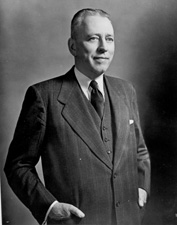Irving Ives
Irving McNeil Ives (born January 24, 1896 in Bainbridge , Chenango County , New York , † February 24, 1962 in Norwich , New York) was an American politician .
Life
After graduating from compulsory school, Ives joined the United States Army early on. In 1917 he was sent to Europe as a soldier , where he was used as an infantryman in World War I and was promoted to the rank of first lieutenant . From 1919 he attended Hamilton College in Clinton , which he was able to successfully complete a year later. In the 1920s he worked as an insurance agent and bank clerk.
In 1930 he was elected to the New York State Assembly as a member of the Republican Party . In the 16 years that Ives was a member of the Chamber of Parliament, he held various offices, including in 1935 as a speaker . From 1936 he held the position of majority leader. He was considered a liberal member of his party and supported the policies of New York Governor Thomas E. Dewey .
In 1946 Ives successfully ran for a seat in the United States Senate , in which he moved on January 3, 1947. From then on he was a delegate at three Republican National Conventions . In 1952 he was re-elected as a senator. In 1954 Ives ran for the office of governor of New York, but was defeated in a very narrow election result to the Democrat W. Averell Harriman , who received only around 11,000 votes more than Ives. In 1958 he was no longer nominated for re-election by his party, so that Ives left the Senate on January 3, 1959.
Irving Ives was also a sponsor of educational institutions; he was the founding dean of the Cornell University School of Industrial and Labor Relations , a branch of education at Cornell University . He died three years after retiring from the Senate at the age of 65.
Web links
- Irving Ives in the Biographical Directory of the United States Congress (English)
- Irving Ives in the database of Find a Grave (English)
| personal data | |
|---|---|
| SURNAME | Ives, Irving |
| ALTERNATIVE NAMES | Ives, Irving McNeil (full name) |
| BRIEF DESCRIPTION | American politician |
| DATE OF BIRTH | January 24, 1896 |
| PLACE OF BIRTH | Bainbridge , New York |
| DATE OF DEATH | February 24, 1962 |
| Place of death | Norwich , New York |


